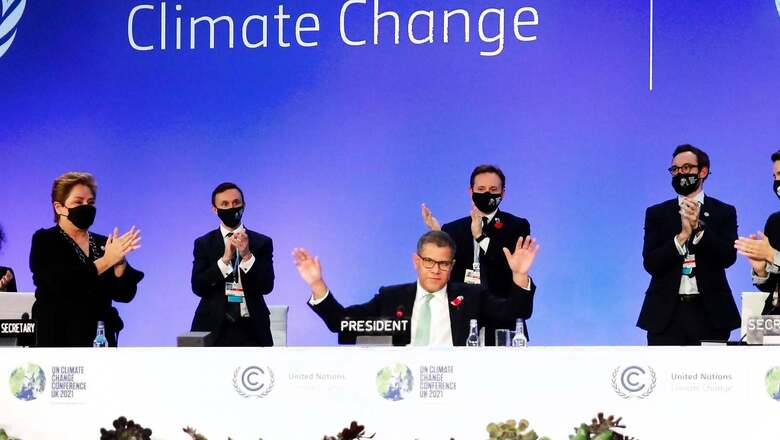
views
Negotiators from nearly 200 countries have accepted a new climate agreement after the COP26 summit in Glasgow concluded its extra time plenary on Saturday with a deal, which recognises India’s intervention for the world to “phase down” rather than “phase out” fossil fuels.
It means the Glasgow Climate Pact is the first ever United Nations climate deal to plan to reduce coal, responsible for greenhouse gases with harmful climate impact. Countries, as part of the agreement, have also agreed to meet next year to discuss further carbon cuts so that the goal to limit warming to 1.5 degrees Celsius can be reached.
“It is so decided,” said Alok Sharma, the President of COP26, as he declared the new pact with a stroke of his gavel after marathon talks which began earlier this month. “I hope we can leave this conference united, having delivered something significant for people and the planet together as one,” he said.
Several countries criticised the change on fossil fuels promoted by India, even as Union Environment Minister Bhupender Yadav asked the Glasgow climate summit how one could expect developing nations to make promises about “phasing out” coal and fossil fuel subsidies when they have still to deal with their development agendas and poverty eradication. Earlier, at a stocktaking plenary, India made an important intervention to express its disappointment over the draft text of the agreement.
The country expressed unfairness towards the developing world and pointed to a “lack of balance” and urgency around achieving climate finance targets. “Mr president (Sharma) thank you for your continued efforts to build consensus. I’m afraid, however, the consensus remained elusive. India stands ready for constructive debate and equitable and just solution in this forum,” Environment Minister Yadav said.
The minister pointed to climate friendly lifestyles and climate justice, as enshrined in the Paris Agreement, as keys to solving the climate crisis caused by “unsustainable lifestyles and wasteful consumption patterns”. Fossil fuels and their use have enabled parts of the world to attain high levels of wealth and wellbeing, and targeting any particular sector is uncalled for, he said.
Every country will arrive at net-zero as per its own national circumstances, strengths and weaknesses, Yadav stressed. “Developing countries have a right to their fair share of the global carbon budget and are entitled to the responsible use of fossil fuels within this scope,” he said.
“In such a situation, how can anyone expect that developing countries can make promises about phasing out coal and fossil fuel subsidies (when) developing countries still have to deal with their development agendas and poverty eradication,” the minister asked. Speaking on the issue of subsidies, Yadav highlighted that they provide much-needed social security and support to people.
“For example, we (India) are giving subsidies for use of LPG to low-income households. This subsidy has been of great help in almost eliminating biomass burning for cooking and improved health from reduction in indoor air pollution, he said. In the end, among major outcomes of the new deal was an agreement to make efforts to “phase down” the use of coal, phase out inefficient fossil fuel subsidies and provide targeted support to the poorest and the most vulnerable in line with national circumstances.
Accelerating 2030 emission-cutting targets, increasing funding for developing nations to adapt to climate change by 2025, boosting the agenda on how to pay for loss and damage that climate change inflicts on developing countries, and agreeing to rules on carbon offset markets were also part of the deal. Sharma, the India-born British Cabinet minister who was in-charge of the summit, appeared close to tears at the end as he apologised for “the way this process has unfolded”.
Swiss Environment Minister Simonetta Sommaruga complained that the process of changing language on fossil fuels at the last minute was insufficiently transparent. “We don’t need to phase down, we need to phase out coal and fossil fuel subsidies,” said Sommaruga, who represents the Environmental Integrity Group, which includes six parties to the United Nations Framework Convention on Climate Change.
She went on to say that the EIG chose not to obstruct an agreement, but that the group was “disappointed.” “This will not move us closer to 1.5, but will make it more difficult to achieve,” Sommaruga explained.
Sharma apologised after hearing complaints from climate-vulnerable countries about the last-minute change.
“May I just say to all delegates I apologize for the way this process has unfolded and I am deeply sorry,” Sharma said before he slammed the gavel. Sharma later told reporters he canvassed delegates in the room to see if the language change on coal would be acceptable. He said he was “sorry” the original language was dropped, “but we do have language on coal — and I think that is a start.”
Sharma had earlier made an impassioned plea to delegates to back the draft, saying it was a “moment of truth” for the planet as talks failed to conclude as planned on Friday and went into an extra day.
Contentions of Developing Nations
India, along with other developing nations, had repeatedly called for richer and developed nations to take increased responsibility in mitigating the climate crisis, while assisting developing nations towards their goals.
In an earlier objection to a section on climate change mitigation to a previous draft, Bolivia’s chief negotiator Diego Pacheco, on behalf of his country and 21 other allied nations, which includes India and China, accused the developed countries of attempting to shift responsibility to the rest of the world and imposing new rules.
He had argued that developing countries should not be held to the same standards as rich countries, which have historically played a larger role in the climate crisis. He also accused rich countries of attempting to “transfer responsibility” to the Global South, CNN reported. Developing countries had also repeatedly complained about so-called climate finance, and it has emerged as the most significant sticking point impeding the talks.
Prime Minister Narendra Modi, who had earlier at the summit announced India’s pledge to become a net-zero emissions country by 2070, had also talked about climate finance in his speech. He had called for developed nations to fulfil the promised $1 trillion as climate finance, saying this should be tracked the same way as climate mitigation.
“India expects developed countries to make $1 trillion available as climate finance as soon as possible. As we track the progress of climate mitigation, we must also track climate finance. Justice would truly be served if pressure is put on those countries that have not lived up to their climate finance commitments,” Modi had said.
After the recently-held G20 Summit, Union Minister Piyush Goyal had said that developed nations that have already enjoyed the fruits of low-cost energy must aim to achieve net zero much faster in order to help the developing countries pursue their development goals. India’s G20 Sherpa had also expressed satisfaction at the language of the summit’s communique “confirming that the developed world has acknowledged that they have not done enough in terms of meeting their commitments”.
UN Chief Warns of Catastrophe, Boris Johnson Upbeat
Ahead of the Glasgow talks, the United Nations had set three criteria for success, and none of them were achieved. The UN’s criteria included pledges to cut carbon dioxide emissions in half by 2030, $100 billion in financial aid from rich nations to poor, and ensuring that half of that money went to helping the developing world adapt to the worst effects of climate change.
“We did not achieve these goals at this conference,” UN Secretary General Antonio Guterres said. “But we have some building blocks for progress.”
However, Guterres warned of an impending “climate catastrophe”, while environmental campaigner Greta Thunberg dismissed Saturday’s COP26 climate conference deal as “blah, blah, blah”. And even those who welcomed the deal in Glasgow said a huge amount of work remained to be done.
Guterres acknowledged the shortcomings of the agreement, in a statement following the deal reached on Saturday evening at the Glasgow conference. “The #COP26 outcome is a compromise, reflecting the interests, contradictions and state of political will in the world today,” he tweeted.
“It’s an important step, but it’s not enough.”
“Our fragile planet is hanging by a thread”, he warned, adding “we are still knocking on the door of climate catastrophe.” In a follow-up tweet, the UN chief sent a message to “young people, indigenous communities, women leaders, all those leading on #ClimateAction.”
“I know you might be disappointed. But we’re in the fight of our lives & this fight must be won.”
British Prime Minister Boris Johnson remained relatively upbeat. “There is still a huge amount more to do in the coming years,” Johnson said.
“But today’s agreement is a big step forward and, critically, we have the first ever international agreement to phase down coal and a roadmap to limit global warming to 1.5 degrees.”
A European Commission statement said the deal kept the targets of the 2015 Paris climate agreement alive, “giving us a chance of limiting global warming to 1.5 degrees Celsius”.
Commission President Ursula von der Leyen said delegates to the conference made progress on commitments to cut back on dangerous emissions, and on raising $100 billion a year to help developing and vulnerable countries. “But there will be no time to relax: there is still hard work ahead,” she added.
As negotiators left the final session after congratulating themselves, they passed a young lone protester who sat silently with red blood-like writing on crossed arms that said: “We are watching.”
With inputs from PTI, AFP, CNN, and the Associated Press.
Read all the Latest India News here

















Comments
0 comment